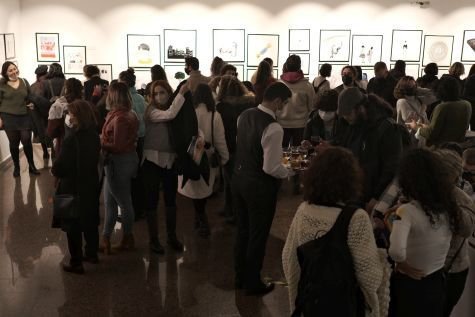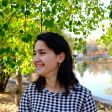*This article was published on Atölye (Workshop) BİA.
Click to read the article in Turkish
Drawer Aslı Alpar's solo exhibition titled "Crime Scene" opened at Ankara Doğan Taşdelen Contemporary Arts Center on Friday (December 17).
Saying that she draws with the "dream of a world free of classes, borders and exploitation," Alpar focuses on the violations of rights we have experienced and witnessed in the 20 years of the ruling Justice and Development Party (AKP).
"There was a participation that was much higher than I expected," Alpar says, adding that she could not get over her surprise at the interest shown.

The authorities responsible for protecting human rights paved the way for rights violations by abusing their powers, says Alpar. About why she chose the title "Crime Scene," she says, "There is a great pain that we have gone through, especially in the past five or six years. And all of these are crimes. Unfortunately, this is not another country anymore, it's a crime scene. Because I tried to do works that describe this period, I found it right to name the exhibition 'Crime Scene'."
"For a better world"
.jpg)
Many events that we have gone through and witnessed, including women who take to the streets for life and equality, the referendum on April 16, 2017, the Gezi Park resistance, the October 10 Ankara Massacre, and others, were "crime scenes," according to Alpar.
"As I draw, I take the burden off my back a bit," says Alpar. "I think there is a type of politics that we have developed together. I call this 'for a world without classes, borders and exploitation.' In fact, I'm trying to draw the imagination of a type of politics, a worldview."
.jpg)
In what she calls crime scenes, the evidence is "almost spoiled," says Alpar. "To be honest, the idea of not being able to find a trace in the crime scene when this crime somehow ends, in other words, when the rule of the AKP ends, scares me."
"Personal is political"
The relationship between the personal and the political is also manifest in this exhibition. "Things we view as personal are, on the other hand, reflections of today's mood," says Alpar. "One of the most basic political orientations of the government is overt misogyny. Therefore, drawing that we have periods is political in a sense."
.jpg)
The relation between the personal and political is not limited to the women's struggle, says Alpar. "We live in a world where everything is political. Our entire lives are contained by the consuming culture and the capitalist system. So, everything about us is political. I think there is a political shadow even on our most personal feelings."
The exhibition will be open until January 9. (MY/NÖ/SO/VK)





.jpg)